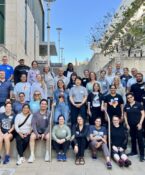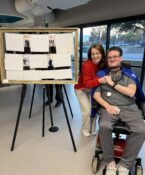Advice for helping kids understand their role in COVID-19 prevention

Family grocery shopping is a different adventure when your mom is a public health epidemiologist called “Dr. Microbe” by her friends and colleagues.
When her daughter was very young, Dr. Diana Cervantes, Director of the MPH Epidemiology program at the HSC School of Public Health, would play a little game of “let’s pretend,” where the whole store was covered in invisible, creepy, grody, nasty stuff.
Mom devised the game this way: See if you can walk completely through the store with your hands crossed under our arms. Don’t touch or put anything in your mouth, keep your fingers away from your eyes and your hands off your face. Afterward, and let’s sanitize twice – once when we get back in the car and again when we get home.
Her daughter is almost 12 now, and while they might not visit the store together as much as in the old days, the two still continue this playful exercise when they do.
“Kids being kids, it’s hard to keep them away from germy or potentially infectious situations, but it’s important to know that they do play a key role in disease transmission,” Dr. Cervantes said.
COVID-19 is a big concern for children, especially as cities and states begin slowly re-opening certain business categories and continue monitoring and adjusting their public health guidance.
“While we have seen some COVID-19 cases reach children, for the most part, kids are more apt to have no signs or symptoms, or maybe only minor indications, yet are still are able to pass the infection on to others,” Dr. Cervantes said.
“It’s not unusual for kids to have runny noses or the occasional low-grade fever based on a variety of considerations like teething, ear infections or the common cold, so parents might not always get those red-flag alerts to warn of such life-threatening diseases as COVID-19.”
Even though public health authorities still recommend caution, activities that have been postponed or cancelled might be coming back with COVID-19 community changes ahead, including play dates with friends, summer camps, sports practices and other group or close-contact get-togethers.
As with many families, Dr. Cervantes’ daughter has looked forward to summer camp each year since she was 4, and registration for the upcoming August program was secured back in November. Parents may be wrestling right now with ways to proceed safely should these types of events go on in the coming months.
Dr. Cervantes’ infectious disease research and leadership experience with the Texas Department of State Health Services, Tarrant County Public Health and health provider infection control has taken her over the years to schools, parent-advisory groups and other informative presentations where she’s taught easy ways to help kids practice germ protection.
“The vampire move is very popular with kids. They like pretending they’re wearing a spooky cape while practicing safe cough and sneeze etiquette into their sleeve or elbow,” she said.
“Schools and public health educators have also used Glow Germ powders and other teaching tools to show kids the bacteria they might not realize exists on their hands.”
Handwashing and good hygiene can be fun for children with a little creativity, she said.
Liquid or foaming sanitizer that smells nice, bar soaps in interesting shapes and colors, tricks like singing the “happy birthday” song from beginning to end twice, even rhymes for remembering to toss a tissue into the trash after using can all keep kids engaged.
There’s a lot parents can do to keep children motivated, and sources like the CDC have online tips for making handwashing a family activity that sticks.
“After a while, it becomes routine and helps establish good habits that kids can practice all their life,” Dr. Cervantes said. “Even when you’re not watching.”
It’s also helpful for parents to remind kids about potential germs on surfaces and objects that might pose a risk, while encouraging them not to share utensils, foods or drinks with others.
It can be a challenge, but the more kids know about ways that germs are passed from person to person, the less they might groan about having to “think about clean stuff all the time,” Dr. Cervantes said.
How safe are grandparents as COVID-19 restrictions possibly ease up?
Families might want to continue exercising more caution with older relatives, Dr. Cervantes said, because children, especially very young kids, thrive on lots of close attention, like hugging, kissing and other expressions of affection that are very near the face.
“Social distancing is just harder with kids, but what we do know is that infectious disease outbreaks have occurred before, and the more parents can create and reinforce routines, the better,” she said.
“Wash your hands before you eat, after you play, at the end of the day and at other important, defined times – for centuries, this parental advice has continued to be one of our best public health tools for healthier communities.”





Social media